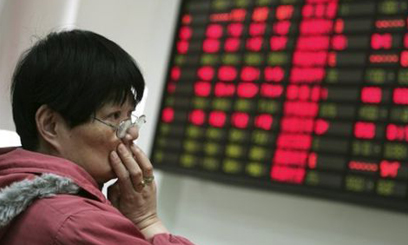Hong Kong, Jul 10 – Asian markets fell on Tuesday, as weakening demand for imports in China provided new evidence of a slowdown in the region’s biggest economy and investors shrugged off a eurozone bid to help Spain.
Official data showed that China’s trade surplus widened more than expected in June as imports slowed, adding to investor nerves before the release of more key data this week including second quarter GDP.
Tokyo ended 0.44 percent, or 39.15 points, lower at 8,857.73, while Sydney finished 0.49 percent, or 20.3 points, down at 4,098.0, and Seoul was off 0.36 percent, or 6.68 points, at 1,829.45.
Shanghai was off 0.29 percent and Hong Kong was flat in afternoon trade, edging up 0.04 points.
Regional bourses tracked declines in the United States and Europe, and extended heavy losses they made on Monday.
“The market is currently holding a very negative view on China’s economy,” Ben Kwong, chief operating officer at KGI Asia, told Dow Jones Newswires.
The trade surplus widened last month to 42.9 percent year-on-year, according to figures from the General Administration of Customs.
“While exports increased at a low level, growth of imports was sharply slower than exports as domestic demand declined due to China’s slowing economy,” customs spokesman Zheng Yuesheng told reporters.
Amid a string of negative economic data from the world’s second-biggest economy, the government has sought to revive growth with measures including two interest rate cuts in the past month.
Analysts had already flagged more government action to boost growth after China reported Monday that the pace of inflation slowed to a 29-month low in June.
The economy expanded an annual 8.1 percent in the first quarter, its slowest pace in three years.
The euro meanwhile slipped against major currencies after European leaders’ latest effort to shore up the ailing currency bloc was met with a scepticism.
After marathon talks in Brussels, eurozone finance ministers agreed to offer Spain 30 billion euros ($37 billion) this month to help its distressed banks.
They also extended a deadline for Madrid to cut its public deficit to the European Union’s 3.0 percent limit by one year to 2014 because of the difficult economic conditions. But traders were unimpressed.
The Spain agreements were “more or less details of procedures and unlikely to affect the entire picture of the eurozone trouble”, said Yosuke Hosokawa, head of FX sales team at Sumitomo Mitsui Trust Bank.
“Everybody knows it will take considerable time to resolve the problem.”
The euro was changing hands at $1.2296 in Tokyo afternoon trade against $1.2312 in New York late Monday.
Against the Japanese currency, the euro bought 97.59 yen from 97.95 yen in US trade the previous day, while the dollar was also weaker at 79.36 yen from 79.56 yen.
On Monday, American stocks fell ahead of the earnings season, with The Dow Jones Industrial Average closing down 0.28 percent. London slipped by 0.62 percent, Frankfurt was off 0.35 percent, and Paris edged 0.38 percent lower.
On oil markets, Brent North Sea crude fell below $100, dropping $1.75 to $98.57, after a Norwegian oil workers’ strike ended. New York’s main contract, light sweet crude for delivery in August dived 97 cents to $85.02 a barrel.
Gold was worth $1,585.10 ounce at 0745 GMT, compared with $1,585.20 late Monday.
In other markets:
— Taipei fell 0.80 percent, or 58.61 points, to 7,251.35.
Hon Hai Precision lost 1.96 percent to Tw$90.1 while Taiwan Semiconductor Manufacturing Co. ended 1.13 percent lower at Tw$79.1.
— Wellington fell 0.44 percent, or 15.47 points, to 3,464.72.
Fletcher Building was down 1.6 percent at NZ$6.10, Telecom Corp. was up 0.4 percent at NZ$2.25 and Air New Zealand held steady at NZ$0.91.



































